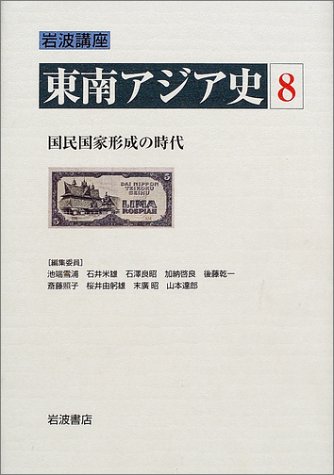9 0 0 0 IR ジョン万次郎・平野廉蔵と小笠原諸島 : 幕末維新期の洋式捕鯨をめぐる一考察
- 著者
- 後藤 乾一
- 出版者
- 早稲田大学アジア太平洋研究センター
- 雑誌
- アジア太平洋討究 (ISSN:1347149X)
- 巻号頁・発行日
- no.29, pp.1-21, 2017-10
- 著者
- 後藤 乾一
- 出版者
- 京都大学
- 雑誌
- 東南アジア研究 (ISSN:05638682)
- 巻号頁・発行日
- vol.34, no.1, pp.57-77, 1996-06
この論文は国立情報学研究所の学術雑誌公開支援事業により電子化されました。Although Iwa (1899-1971) is one of the well-known nationalist leaders in 20th century Indonesia, his thoughts and actions have not received due attention in contemporary Indonesian studies. As a son of Sundanese aristocratic family (menak) he was expected by his parents to become an official of the Dutch colonial government. However, he refused to become one of the "indigeneous elites" who supported the colonial system from the below. During his stay in the Netherlands in the early 1920s, he was elected as chairman of Perhimpunan Indonesia and contributed greatly to making the organization more nationalistic. Furthermore, upon obtaining a law degree, he moved to Moscow in order to combine the nationalist movement and the international communist movement. Among the top nationalist leaders of his generation, he is exceptional in having such an experience. Due to his political background, the colonial government in Batavia arrested him in 1929 and soon exiled him to Bandaneira Island, where he was forced to spend about 10 years until the early 1940s. From independence in August 1945 until his death in 1971,he held three cabinet posts, but at the same time he also had a number of bitter experiences, including two years of imprisonment for his connection to the "July Third Affair" of 1946,as well as being forced to resign as Defense Minister under political pressure from the army. He strongly insisted that the armed forces should be an instrument of the state and opposed the concentration of power in the armed forces. He also insisted that such a culturally diverse country as Indonesia should have a political system whereby each ethnic group could develop its own culture and identity. He believed that this was more desirable than strengthening of unification from the center, in order to bring real unity to the country. When we look at the Indonesian political situation in 1990s, Iwa's arguments concerning the politico-military relationship and the coexistence of nationality and ethnicity still appear pertinent.
4 0 0 0 OA 元台湾特別志願兵の戦時東ティモール体験 -陳千武氏ヒアリング記録-
- 著者
- 後藤 乾一
- 雑誌
- アジア太平洋討究 (ISSN:1347149X)
- 巻号頁・発行日
- vol.7, pp.135-161, 2005-05
- 著者
- 後藤 乾一
- 出版者
- 早稲田大学アジア太平洋研究センター
- 雑誌
- アジア太平洋討究 (ISSN:1347149X)
- 巻号頁・発行日
- vol.16, pp.21-33, 2011-05-01
2 0 0 0 OA 下級兵士がみた植民戦争 -台湾における「生蕃討伐」と加藤洞源-
- 著者
- 後藤 乾一
- 雑誌
- アジア太平洋討究 (ISSN:1347149X)
- 巻号頁・発行日
- vol.9, pp.131-148, 2007-03
2 0 0 0 OA 早稲田大学社会科学研究所所蔵の東南アジア・コレクション
- 著者
- 後藤 乾一
- 出版者
- Japan Society for Southeast Asian Studies
- 雑誌
- 東南アジア -歴史と文化- (ISSN:03869040)
- 巻号頁・発行日
- vol.1992, no.21, pp.202-204, 1992-06-01 (Released:2010-03-16)
- 被引用文献数
- 1 1
2 0 0 0 OA ジョン万次郎・平野廉蔵と小笠原諸島-幕末維新期の洋式捕鯨をめぐる一考察
- 著者
- 後藤 乾一
- 出版者
- 早稲田大学アジア太平洋研究センター
- 雑誌
- アジア太平洋討究 (ISSN:1347149X)
- 巻号頁・発行日
- vol.29, pp.1-21, 2017-10-31
2 0 0 0 OA 明治期小笠原諸島の産業開発と鍋島喜八郎
- 著者
- 後藤 乾一
- 出版者
- 早稲田大学アジア太平洋研究センター
- 雑誌
- アジア太平洋討究 (ISSN:1347149X)
- 巻号頁・発行日
- vol.36, pp.57-89, 2019-03-25
- 著者
- 後藤 乾一
- 出版者
- 早稲田大学アジア太平洋研究センタ-
- 雑誌
- 社会科学討究 (ISSN:05829291)
- 巻号頁・発行日
- vol.26, no.2, pp.p199-236, 1981-06
1 0 0 0 OA アジア太平洋戦争と東南アジア
- 著者
- 後藤 乾一
- 出版者
- 外務省外交史料館
- 雑誌
- 外交史料館報 (ISSN:09160558)
- 巻号頁・発行日
- vol.27, pp.1-25, 2013 (Released:2022-03-15)
1 0 0 0 IR 元日本兵クンプル乙戸(1918〜2000年)と戦後インドネシア
- 著者
- 後藤 乾一
- 出版者
- 学術雑誌目次速報データベース由来
- 雑誌
- アジア太平洋討究 (ISSN:1347149X)
- 巻号頁・発行日
- no.4, pp.49-63, 2002-03
- 著者
- 後藤 乾一
- 出版者
- 早稲田大學アジア太平洋研究センター
- 雑誌
- アジア太平洋討究 (ISSN:1347149X)
- 巻号頁・発行日
- no.11, pp.29-51, 2008-10
1 0 0 0 OA 図南・服部徹の思想と行動 -明治期「南進」論者の歴程-
- 著者
- 後藤 乾一
- 出版者
- 早稲田大学アジア太平洋研究センター
- 雑誌
- アジア太平洋討究 (ISSN:1347149X)
- 巻号頁・発行日
- vol.34, pp.31-63, 2018-10-23
1 0 0 0 IR 勢理客文吉=イスマイル・B・セリキャクの歴程 : 沖縄・硫黄島・インドネシア
- 著者
- 後藤 乾一
- 出版者
- 法政大学沖縄文化研究所
- 雑誌
- 沖縄文化研究 (ISSN:13494015)
- 巻号頁・発行日
- no.46, pp.1-88, 2019-03-31
- 著者
- 山本 まゆみ 倉沢 愛子 Horton William.B 高地 薫 山崎 功 後藤 乾一 スリョメンゴロ ジャファール
- 出版者
- 宮城大学
- 雑誌
- 基盤研究(B)
- 巻号頁・発行日
- 2019-04-01
歴史研究では、政治体制の変化で時間軸を「分断」する傾向があり、インドネシア近現代史では、第2次世界大戦で歴史の流れを「分断」する研究が通例となっている。だが、人脈や教育、社会活動という点から通観すると、スカルノと日本軍政監部の関係、インドネシア国軍やPETAの軍事教練、そして現在も存続する「隣組」のように、「分断」ではなく「連続性」や「継続性」を見出せる。本研究は、日本占領期を、独立後のインドネシアの播種期と捉え、占領期の軍の人脈、教育、文化・社会活動が、戦後社会に与えた影響を検証することを目的とする。本研究は、研究の国際貢献を念頭に、占領期研究の多言語史料や研究成果を英語で発表する。
1 0 0 0 IR 図南・服部徹の思想と行動 : 明治期「南進」論者の歴程
- 著者
- 後藤 乾一
- 出版者
- 早稲田大学アジア太平洋研究センター
- 雑誌
- アジア太平洋討究 (ISSN:1347149X)
- 巻号頁・発行日
- no.34, pp.31-63, 2018-10
1 0 0 0 IR 戦前期沖縄とインドネシア : 又吉武俊の「南方関与」を事例に
- 著者
- 後藤 乾一
- 出版者
- 早稲田大学アジア太平洋研究センター
- 雑誌
- アジア太平洋討究 (ISSN:1347149X)
- 巻号頁・発行日
- no.33, pp.43-75, 2018-03
1 0 0 0 インドネシアの1974年1月15日事件〔含関係資料〕
- 著者
- 増田 与 後藤 乾一 村井 吉敬
- 出版者
- 早稲田大学アジア太平洋研究センタ-
- 雑誌
- 社会科学討究 (ISSN:05829291)
- 巻号頁・発行日
- vol.19, no.3, pp.93-168, 1974-04
1 0 0 0 OA 後記
- 著者
- 後藤 乾一
- 出版者
- 早稲田大学アジア太平洋研究センター
- 雑誌
- アジア太平洋討究 (ISSN:1347149X)
- 巻号頁・発行日
- vol.20, pp.403-407, 2013-02-28



